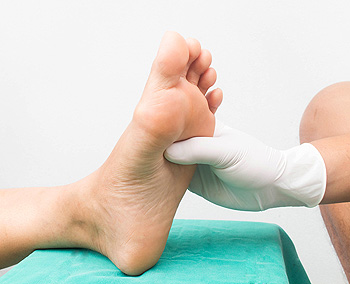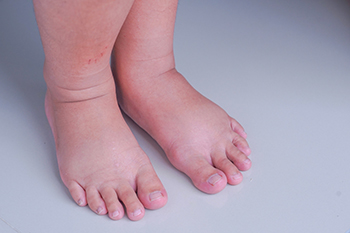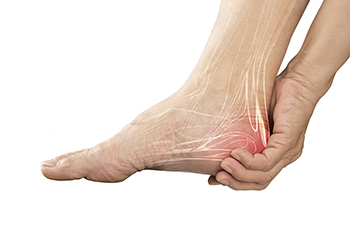Connect With Us
Blog
Items filtered by date: July 2022
What to Do About Sweaty Feet

If you are exercising a lot, or the weather is very hot, your feet may perspire more than normal. But if you find that your feet sweat for no particular reason when you are at rest, you may have a condition known as plantar hyperhidrosis. Although the cause of hyperhidrosis is still unknown, medical experts have determined that the brain signals to the sweat glands that your body is overheating. As a result, the sweat glands in several parts of the body, including the soles of your feet, work overtime to regulate your body temperature. It is not known how to eliminate hyperhidrosis completely, but a number of temporary measures can keep it controlled. Treatment options, which vary with the severity of the condition, include topical gels or lotions, injections, and oral medication. Another treatment option is iontophoresis, which involves sending a mild electrical current through a foot bath to temporarily shut down the sweat glands in the feet. For guidance on which treatment options are best for you, a visit with a podiatrist is suggested.
If you are suffering from hyperhidrosis contact one of our podiatrists of Sutera and Jones Surgical Podiatry. Our doctors can provide the care you need to attend to all of your foot and ankle needs.
Hyperhidrosis of the Feet
Hyperhidrosis is a rare disorder that can cause people to have excessive sweating of their feet. This can usually occur all on its own without rigorous activity involved. People who suffer from hyperhidrosis may also experience sweaty palms.
Although it is said that sweating is a healthy process meant to cool down the body temperature and to maintain a proper internal temperature, hyperhidrosis may prove to be a huge hindrance on a person’s everyday life.
Plantar hyperhidrosis is considered to be the main form of hyperhidrosis. Secondary hyperhidrosis can refer to sweating that occurs in areas other than the feet or hands and armpits. Often this may be a sign of it being related to another medical condition such as menopause, hyperthyroidism and even Parkinson’s disease.
In order to alleviate this condition, it is important to see your doctor so that they may prescribe the necessary medications so that you can begin to live a normal life again. If this is left untreated, it is said that it will persist throughout an individual’s life.
A last resort approach would be surgery, but it is best to speak with your doctor to find out what may be the best treatment for you.
If you have any questions please feel free to contact one of our offices located in Media, Glen Mills, Riddle Memorial Hospital, and Concordville, PA . We offer the newest diagnostic and treatment technologies for all your foot and ankle needs.
Self-Care for Neuropathy

Of the many afflictions that can affect the feet, neuropathy is perhaps the most insidious and deceptive. Neuropathy can occur in the feet when the nerves are so badly damaged you might not feel pain when something is wrong with your foot and you may also feel that something is causing pain when nothing is. This nerve damage can occur from an injury, illness, infection, or other cause. Any range of symptoms can be felt because there is a spectrum of different nerves that may be affected. However, there are some self-care tricks that you can utilize for your neuropathy if it is not very severe. For example, you might try soaking your feet in a foot bath filled with chamomile or nettle leaves. These leaves are rich in antioxidants and aid in the pain relief of muscles and joints. It is beneficial to soak in this foot bath for approximately 30 minutes. Additionally, you might try giving yourself a massage or asking a friend to massage the affected areas. The purpose is to promote blood circulation. Lastly, you might consider applying an ice pack to the affected area for short intervals of time about twice a day. These are just some of the many different self-care tricks you might use for your neuropathy. It is always best, however, to consult a podiatrist about your condition.
Neuropathy
Neuropathy can be a potentially serious condition, especially if it is left undiagnosed. If you have any concerns that you may be experiencing nerve loss in your feet, consult with one of our podiatrists from Sutera and Jones Surgical Podiatry. Our doctors will assess your condition and provide you with quality foot and ankle treatment for neuropathy.
What Is Neuropathy?
Neuropathy is a condition that leads to damage to the nerves in the body. Peripheral neuropathy, or neuropathy that affects your peripheral nervous system, usually occurs in the feet. Neuropathy can be triggered by a number of different causes. Such causes include diabetes, infections, cancers, disorders, and toxic substances.
Symptoms of Neuropathy Include:
- Numbness
- Sensation loss
- Prickling and tingling sensations
- Throbbing, freezing, burning pains
- Muscle weakness
Those with diabetes are at serious risk due to being unable to feel an ulcer on their feet. Diabetics usually also suffer from poor blood circulation. This can lead to the wound not healing, infections occurring, and the limb may have to be amputated.
Treatment
To treat neuropathy in the foot, podiatrists will first diagnose the cause of the neuropathy. Figuring out the underlying cause of the neuropathy will allow the podiatrist to prescribe the best treatment, whether it be caused by diabetes, toxic substance exposure, infection, etc. If the nerve has not died, then it’s possible that sensation may be able to return to the foot.
Pain medication may be issued for pain. Electrical nerve stimulation can be used to stimulate nerves. If the neuropathy is caused from pressure on the nerves, then surgery may be necessary.
If you have any questions, please feel free to contact one of our offices located in Media, Glen Mills, Riddle Memorial Hospital, and Concordville, PA . We offer the newest diagnostic and treatment technologies for all your foot care needs.
Why Live with Pain and Numbness in Your Feet?
Reasons and Preventive Methods for Swollen Feet

As people get older, the feet and ankles have a higher blood volume level, which often results in having swollen feet and ankles. This generally produces little or no pain, despite the fact that some patients find it difficult to move their ankles as they once did. Swelling of the feet can occur for many reasons. A common concern is additional salt in the diet, as this may cause water retention. An antidote may be drinking plenty of fresh water daily, which is helpful in moving the fluids around in the body. Many people can develop swollen feet if they sit for extended periods of time, and this is common while flying. Additionally, blood can collect in the ankles in warm climates, and gravity may contribute significantly toward this. Losing weight, in addition to reducing sugar intake and avoiding unhealthy fats, may help to control swollen feet and ankles. Relief may come from elevating the feet as often as possible, and this is typically effective when coupled with other methods to reduce existing swelling. If you suffer from swollen feet and ankles, please confer with a podiatrist who can guide you toward proper management of this condition.
Swollen feet can be a sign of an underlying condition. If you have any concerns, contact one of our podiatrists of Sutera and Jones Surgical Podiatry. Our doctors can provide the care you need to keep you pain-free and on your feet.
Swollen feet are a common ailment among pregnant women and people who stand or sit for extended periods. Aging may increase the possibility of swollen feet and patients who are obese often notice when their feet are swelling too. There may be medical reasons why swollen feet occur:
- Phlebitis - A condition that causes the veins to become inflamed and can also cause leg pain.
- Liver disease - This may lead to low blood levels of albumin which is a protein. This can cause fluid in the blood to pass into the tissues and several areas of the body can become swollen.
- Heart failure - When the heart doesn’t pump properly the blood that is normally pumped back to the heart can pool in the veins of the legs causing swollen feet.
- Kidney disease - One of the main functions of the kidneys is releasing excess fluid in the body. This type of condition can make it difficult for the kidneys to function properly, and as a result the feet may become swollen.
- Deep-vein thrombosis (DVT)- This is a serious condition where blood clots form in the veins of the legs. They can block the return of blood from the legs to the heart which may cause the feet to swell. It is important to be treated by a podiatrist if this condition is present.
Swollen feet can also be caused by bone and tendon conditions, including fractures, arthritis, and tendinitis. Additionally, there may be skin and toenail conditions and an infection may cause the feet to swell. Patients who take medicine to treat high blood pressure may be prone to getting swollen feet.
Many patients elevate their feet to help relieve the swelling and this is generally a temporary remedy. When a podiatrist is consulted the reason behind the swelling can be uncovered and subsequently treated.
If you have any questions please feel free to contact one of our offices located in Media, Glen Mills, Riddle Memorial Hospital, and Concordville, PA . We offer the newest diagnostic tools and technology to treat your foot and ankle needs.
How Older People Can Prevent Plantar Fasciitis

Many people over age 65 develop foot problems. One of the most common of these problems is plantar fasciitis, which causes pain in the heel of the foot. Plantar fasciitis is when the band of connective tissue running from the heel to the toes on the sole of the foot is overstretched or micro tears occur. Prevention of plantar fasciitis includes improving posture and walking properly, stretching the calves and ankles regularly, wearing shoes that fit well, and rolling tennis balls or frozen water bottles under the feet while sitting down to stretch and stimulate the bottoms of the feet. If you are a senior who continues to have heel pain or a caregiver of a senior complaining of such pain, see a podiatrist who can properly diagnose the condition and provide appropriate treatment.
Proper foot care is something many older adults forget to consider. If you have any concerns about your feet and ankles, contact one of our podiatrists from Sutera and Jones Surgical Podiatry. Our doctors can provide the care you need to keep you pain-free and on your feet.
The Elderly and Their Feet
As we age we start to notice many changes in our body, but the elder population may not notice them right away. Medical conditions may prevent the elderly to take notice of their foot health right away. Poor vision is a lead contributor to not taking action for the elderly.
Common Conditions
- Neuropathy – can reduce feeling in the feet and can hide many life-threatening medical conditions.
- Reduced flexibility – prevents the ability of proper toenail trimming, and foot cleaning. If left untreated, it may lead to further medical issues.
- Foot sores – amongst the older population can be serious before they are discovered. Some of the problematic conditions they may face are:
- Gouging toenails affecting nearby toe
- Shoes that don’t fit properly
- Pressure sores
- Loss of circulation in legs & feet
- Edema & swelling of feet and ankles
Susceptible Infections
Diabetes and poor circulation can cause general loss of sensitivity over the years, turning a simple cut into a serious issue.
If you have any questions please feel free to contact one of our offices located in Media, Glen Mills, Riddle Memorial Hospital, and Concordville, PA . We offer the newest diagnostic and treatment technologies for all your foot and ankle needs.
Blog Archives
- April 2025
- March 2025
- February 2025
- January 2025
- December 2024
- November 2024
- October 2024
- September 2024
- August 2024
- July 2024
- June 2024
- May 2024
- April 2024
- March 2024
- February 2024
- January 2024
- December 2023
- November 2023
- October 2023
- September 2023
- August 2023
- July 2023
- June 2023
- May 2023
- April 2023
- March 2023
- February 2023
- January 2023
- December 2022
- November 2022
- October 2022
- September 2022
- August 2022
- July 2022
- June 2022
- May 2022
- April 2022
- March 2022
- February 2022
- January 2022
- December 2021
- November 2021
- October 2021
- September 2021
- August 2021
- July 2021
- June 2021
- May 2021
- April 2021
- March 2021
- February 2021
- January 2021
- December 2020
- November 2020
- October 2020
- September 2020
- August 2020
- July 2020
- June 2020
- May 2020
- April 2020
- March 2020
- February 2020
- January 2020
- December 2019
- November 2019
- October 2019
- September 2019
- August 2019
- July 2019
- June 2019
- May 2019
- April 2019
- March 2019
- February 2019
- January 2019
- December 2018
- November 2018
- October 2018
- September 2018
- August 2018
- July 2018
- June 2018
- May 2018
- April 2018
- March 2018
- February 2018
- January 2018
- December 2017
- November 2017
- October 2017
- September 2017
- August 2017
- July 2017
- June 2017
- May 2017
- April 2017
- March 2017
- February 2017
- January 2017
- December 2016
- November 2016
- October 2016
- September 2016
- August 2016
- July 2016
- June 2016
- May 2016
- April 2016
- March 2016
- February 2016
- January 2016
- December 2015
- November 2015
- October 2015
- September 2015
- August 2015
- July 2015
- June 2015
- May 2015
- April 2015
- March 2015
- February 2015
- January 2015
- December 2014
- November 2014
- October 2014
- September 2014

